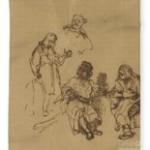 One of my favorite pieces of art is a linoleum print by New Mexico artist Jack McCarthy, entitled “A Walk with Dad.” Based on the Old Testament story of Abraham and Isaac, it portrays a frightened Isaac held and muzzled by his father, a knife poised for the sacrifice. Only the one eye betrays Isaac’s fear. Abraham’s expression is without emotion.
One of my favorite pieces of art is a linoleum print by New Mexico artist Jack McCarthy, entitled “A Walk with Dad.” Based on the Old Testament story of Abraham and Isaac, it portrays a frightened Isaac held and muzzled by his father, a knife poised for the sacrifice. Only the one eye betrays Isaac’s fear. Abraham’s expression is without emotion.
Over the years my conversations with men have convinced me that there may be no relationship that exercises greater influence on men than their relationship with their fathers. Deep into adulthood, that early and influential relationship can determine the choices we make.
The engine can vary, whether it lies in the behavior of a son or it lies in the behavior of the father:
- a son’s conformity or rebellion
- a father’s absence or presence
- a relationship governed by life-giving guidance or overbearing control — gentle care or cruel mistreatment
- a journey into adulthood marked by freedom and maturity nurtured — or control and permission giving that stifles the journey
In telling the story, McCarthy challenges us to think about this seminal Old Testament story from a different point of view than the one that typically shapes the way we read it. Historically the discussion of this story has focused on the nature of God’s demand and the test that Abraham faced. The Danish theologian Soren Kierkegaard describes the story as one that distinguishes between actions that are ethically and religiously right — between resignation and faith.
McCarthy’s image takes us to another level in the story and one that original writer did not contemplate:
- What was Isaac’s relationship with his father?
- How deeply did he understand his father’s faith?
- Did Abraham confide in Isaac?
McCarthy’s image suggests the possibility that Abraham’s faith and behavior were less than transparent to his son — his relationship with Isaac thread through with unknowns and fears. That may or may not have been the case. McCarthy may or may not have meant for us to get that out of his retelling of the story. But I keep a print of McCarthy’s work in our library to remind me of how deeply we all struggle with the inheritance of our relationships with our parents.
Some things to remember:
- Honesty, love, trust, and conversation are essential to life-giving relationships.
- Where we have been denied those gifts, it is important to remember that the relationships we have had with our parents can be just as influential as positive relationships.
- When we simply rebel and rebel blindly a difficult relationship with our parents has the potential for exercising destructive power over our lives.
- When that happens, surfacing the history and weighing it with spiritual maturity is the only key to freedom and health.
- If your parents have blessed you with a life-giving relationship, pass it on.












